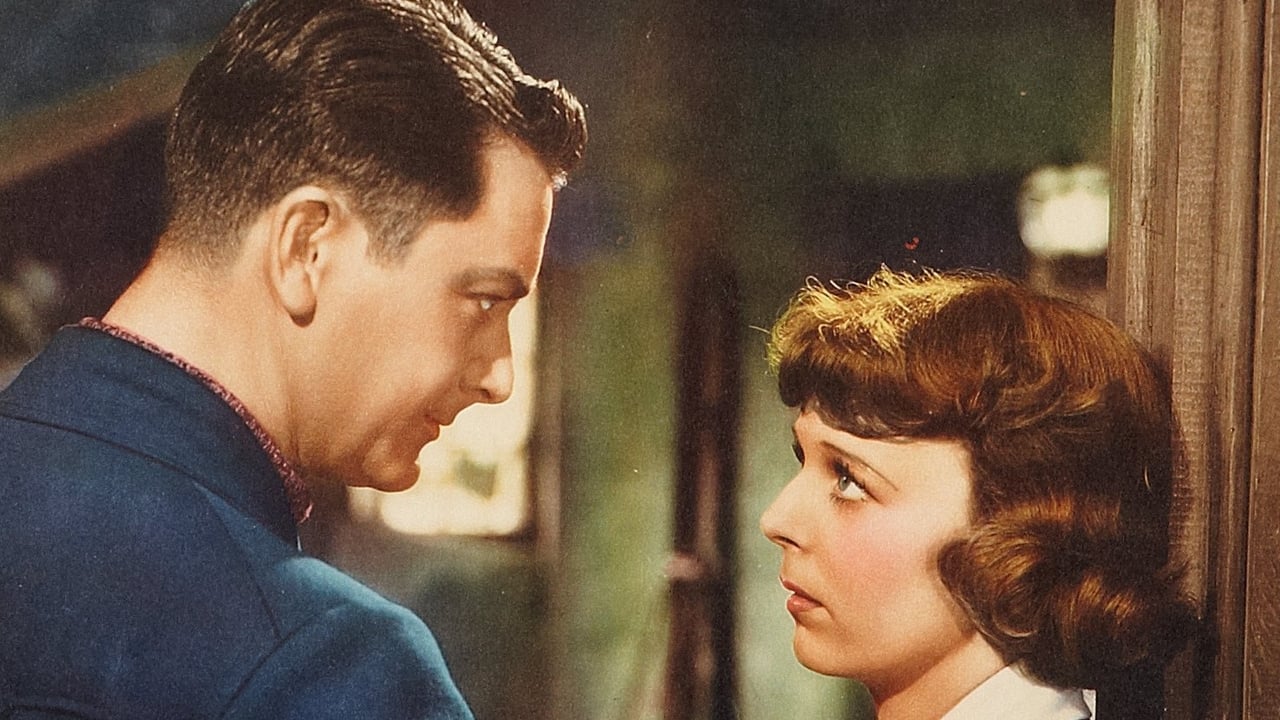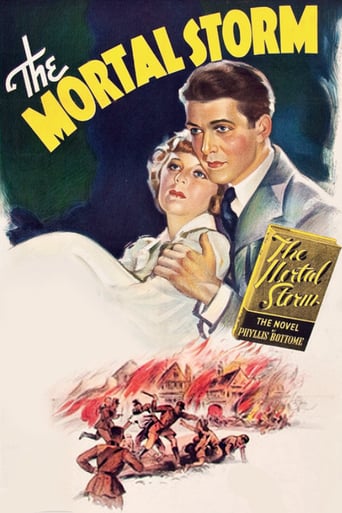Diagonaldi
Very well executed
ManiakJiggy
This is How Movies Should Be Made
Dorathen
Better Late Then Never
Francene Odetta
It's simply great fun, a winsome film and an occasionally over-the-top luxury fantasy that never flags.
AaronCapenBanner
Frank Borsage directed this powerful and still timely drama set in 1933 Germany, in a little village in the Alps, where respected Professor Roth(played by Frank Morgan) is having his birthday(Jan. 30) observed by his family and students. Things are happy until the results of the national election are announced, with Hitler and his Nazi party the overwhelming winners. This creates a wave of pro-Nazi zealotry that ends up dividing the family. Daughter Freya(played by Margaret Sullivan) is torn between two suitors(played by Robert Young and James Stewart). When her father is arrested and later dies in prison, Freya chooses Stewart because he hates the Nazis, but he is also a fugitive, as is her whole family, leading to a fateful ski trip escape down the mountains to freedom across the border...also costars Robert Stack, Ward Bond, and Bonita Granville.Still potent film shows in chilling and shocking detail how blind party loyalty can grip a nation, turning friends and family against each other because they dare question their own government, a problem that has not gone away, but merely changes form... Only a vigilant and informed citizenry can prevent such a thing from happening again.
atlasmb
Mortal Storm is a historical drama from 1940, released during WWII before the U.S. entered the war. It is a time capsule showing how some Americans in 1940 viewed the beginnings of Hitler's rise to power in 1933. And it portends the later atrocities of Naziism, warning us that the barbaric acts of dictators can emerge almost innocently from the misguided values of a population that is searching for something better.At its heart, Mortal Storm is a story of ideals. It shows that every value has a consequence and is, therefore, important.Our story starts in a small German town, 1933. Professer Roth is a respected educator who calls himself "an absent-minded professor". He is surrounded by an adoring family, loving colleagues, and a wealth of students at his feet, including Jimmy Stewart and Robert Cummings --two of Hollywood's squeaky clean everymen--as Brietner and Marlberg. That evening, the family is gathered to celebrate Prof. Roth's 60th birthday. As they sit around the dinner table, we might mistake this charming tableau as a typically American family in Hollywood movies.The professor makes a toast to "tolerance and sense of humor". His beautiful daughter Freya becomes engaged to Fritz Marberg. Joy abounds, though Martin Brietner, another pretender for the hand of Freya Roth, seems somewhat sad that Fritz beat him to it. Adding the piece de resistance to this happy occasion, the family maid, Marta announces that Adolph Hitler has been named Chancellor of Germany. The family tunes in to the live radio broadcast of the event with cheers of happiness and assertions of future greatness for the Fatherland. The announcer refers to the "power and glory" to come. The two older sons of Prof. Roth assert that Germany will now become "master of Europe and the world" and that "Nations who want peace will have nothing to fear", that "we should be intolerant to anyone who opposes" the new direction of Germany. Amidst these brave hurrahs, Professor Roth timidly suggests that it is important to allow everyone his own opinions. Roth's young son, with a foreshadowing of the actual path Nazi Germany will take, says they are taught in school that the "individual must be sacrificed to the welfare of the state."By now, it is fairly clear what ideals are in play. The announcement of Hitler's appointment is a pivot in the history of Germany and the world. And it is a pivot in our story. From this moment on, intolerance will be the order of the day.The movie's plot demonstrates that Nationalism is nothing but intolerance parading as patriotism. Guilt by association becomes a part of everyday life. Public demonstrations of loyalty to the party ("Heil Hitler" ) become de rigeur, leading to bullying and widespread party thuggery. Those who express opposition to the party are branded traitors. Party members denounce those "pacifist vermin". We see more and more citizens in uniform as society becomes militarized. The Nazi version of Nationalism is shown to be racism, espousing "racial purity" and "Aryan supremacy". (The seeds of Nazi German racism were planted long before Hitler, but that is a story outside the scope of this movie.)Intolerance leads to boycotting for purely political reasons, then to the burning (censoring) of any media that might differ from the party line. This approach to the design of a culture finally results in anti-intellectual hooliganism. As the atrocities pile up, Freya finally breaks off her engagement.Martin escapes Germany via a secret mountain pass. A patrol comes looking for him, but they are stonewalled by his mother, Freya and Elsa, a farm employee. At this point the story reveals its one flaw. When Elsa runs upstairs to evade the questioning of the patrol, she stops to pray at a small religious shrine, crossing herself in the Catholic tradition. Whether out of ignorance or an intention to paint the (Nazi) opposition as a godless organization, the film clearly wants us to believe that horrible actions of such a group could not be sanctioned by anyone with a religious viewpoint. This is demonstrated through the remainder of the film. The only times praying or God are mentioned it is by those who resist the Nazis. This is a historical inaccuracy. The Catholic church specifically was not an enemy of this dictatorship. The Nazi movement was not atheistic. But the film might have mislead viewers in 1940 to think that was the case. The film continues with the arrest of Prof. Roth for "theory antagonistic to ideals" of the state. He disappears. Later we are told he died in captivity. At this point, we might reflect on the oppression, torture and extermination of the millions who were targets of Hitler and his subordinates in the name of racial purity, including those of the Jewish faith and gypsies.The rest of the story details Frau Roth's attempt to leave Germany with Freya and her youngest son, and Martin's attempt to reunite with Freya in Austria.The film ends with a voice-over narration from the poem "The Gate of the Year", an ode to religious faith that is misplaced here, probably to assure viewers that the world situation, though grim, will improve sometime in the future.I will end by saying that the music in this film was well done. And Mortal Storm features a cast for whom "wow" seems to be the best descriptor. Their roles were portrayed with conviction and talent.
gavin6942
The Roth family lead a quiet life in a small village in the German Alps during the early 1930's. When the Nazi's come to power, the family is divided and Martin Brietner (James Stewart), a family friend is caught up in the turmoil.This is a hard film to find -- I checked in multiple libraries throughout the state of Wisconsin, and every considered buying it. And even then, a good copy is hard to track down. Why? The story is excellent, and it is early James Stewart... this should be a classic, but instead remains almost completely unknown.I want this film to see a resurgence (or maybe just a surge). I want it to get a decent transfer, released on a nice DVD with features, and I want people to have actually heard of it. Few films had the courage to stand up to Hitler before the war, and I doubt any of the few others did so as forcefully as this one did.
DKosty123
This very political look at Pre-World War 2 Europe is a solid multi-faceted drama about a family being torn apart by the Nazis. While the film does not mention Germany by name, it has plenty of swastika's and does feature a ski escape sequence to Austria. Jimmy Stewart leads a fine cast with a great role by Frank Morgan as the ailing father of the family and Margaret O'Brien. Robert Young plays a Nazi officer who is a big departure from Father Knows Best which came much later. Young is convincing in his role.The most powerful and disturbing line to me is when the son quotes what he is being taught in school. The line goes like "We must all sacrifice our personal lives and beliefs in order to further the cause of our government." While I might not have the quote exactly right, the idea behind it is that we are supposed to follow our government like some bunch of blind and mindless robots. This idea reminds me very much of some issues in our government and society today.The reason this is not the perfect movie is it does suffer from the time the movie was made. The ski escape sequence particularly suffers from the crude technology of the times. It is hard to imagine all those actors out in the cold mountains skiing without being dressed warmly. This stuff is very obviously staged in a studio and crudely done.That does not take away from a well written script, a terrific cast and a timeless drama.

